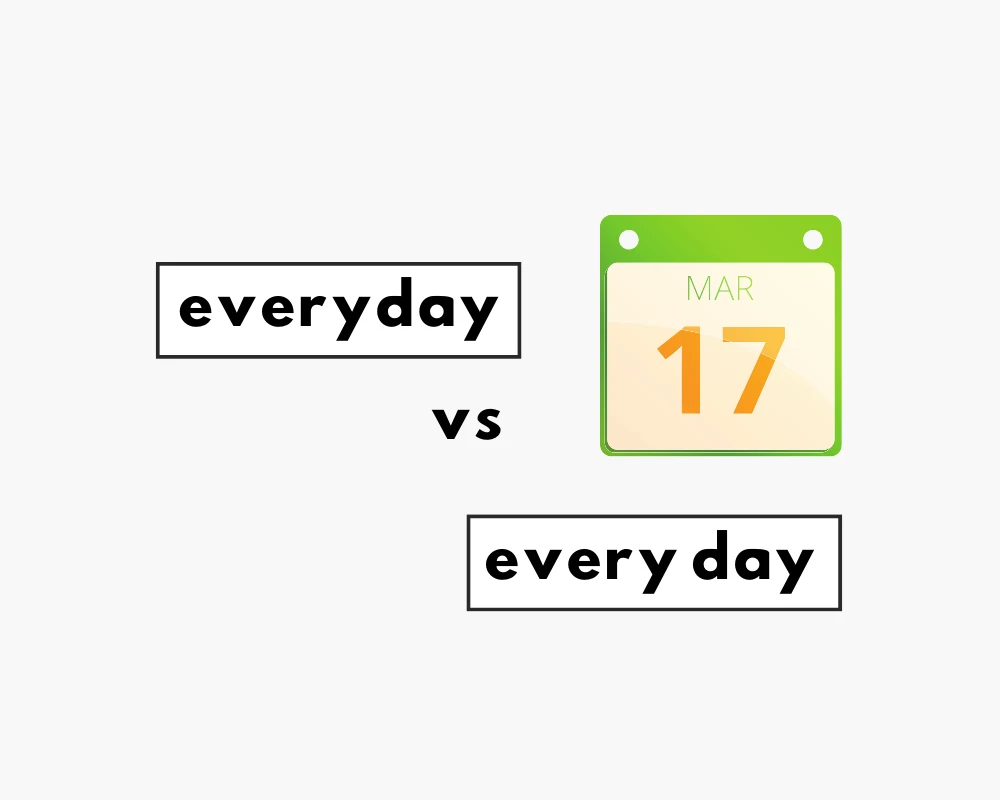Everyday vs. Every Day
Language is a fascinating and intricate tapestry woven with words that hold subtle nuances and meanings. Even small differences in spelling can completely alter the intended message. One such pair of words that often causes confusion is “everyday” and “every day.”
The smartphone has become an everyday necessity for most people.
I try to read for at least 30 minutes every day before bed.
She likes to bake cookies everyday.
Dealing with unexpected issues is an every day challenge in my job.
Despite their apparent similarity, these terms have distinct uses and meanings. In this blog post, we will dive into the difference between “everyday” and “every day” and explore how they should be correctly employed in everyday writing.
When to use ‘everyday’ or ‘every day’
| Examples with “everyday” | Examples with “every day” |
| Don’t let the problems of everyday life get you down. | I wear sweatpants almost every day. |
Everyday (adjective)
The word “everyday” is an adjective that describes something as ordinary, commonplace, or routine. It characterizes things that are a part of our daily lives and not special or extraordinary in any way. For example:
- Wearing jeans and a t-shirt is my everyday attire.
- The everyday routine of going to work can be monotonous.
- The everyday challenges of life can sometimes be overwhelming.
In these examples, “everyday” modifies nouns (attire, routine, challenges) to indicate that they are regular, unremarkable aspects of daily existence.
“every day” (two words), think of the space as representing the individual days passing, marking frequency (“each day”).
Every Day (Adverb + Noun)
On the other hand, “every day” is a combination of the adverb “every” and the noun “day.” When used together, it indicates the frequency or regularity of an action that occurs daily. For instance:
- I exercise every day to stay fit.
- He reads a chapter of his book every day before bed.
- They meet for coffee every day after work.
In these sentences, “every day” describes the frequency with which the actions occur, emphasizing their daily occurrence.
Key Takeaways
To summarize, here are the key differences between “everyday” and “every day”:
- “Everyday” is an adjective that describes something as ordinary, routine, or commonplace. It modifies nouns to indicate their regularity in daily life.
- “Every day” is a combination of the adverb “every” and the noun “day.” It is used to express the regularity or frequency of an action that occurs daily
Common Mistakes
The confusion between these two terms often stems from their similar pronunciation and appearance. However, using them incorrectly can lead to misunderstandings in your writing. Here are a few examples of common mistakes to avoid:
Incorrect: I go to the gym everyday. Correct: I go to the gym every day.
Incorrect: His everyday behavior is unacceptable. Correct: His everyday behavior is unacceptable.
Incorrect: She practices the piano every day before school. Correct: She practices the piano every day before school.
Language precision is essential in effective communication, and understanding the distinction between “everyday” and “every day” is just one of many facets of linguistic accuracy. The next time you sit down to write, remember that “everyday” is used to describe something ordinary or routine, while “every day” indicates the frequency of an action on a daily basis. By applying this knowledge, you can enhance the clarity and effectiveness of your writing, ensuring that your everyday communication is impeccable, every day.
Read about other commonly confused words
Worksheet
According to the post, when is “everyday” (one word) used?
The post’s study tip suggests thinking of the space in “every day” as representing what?
Based on the post, what does the phrase “every day” (two words) primarily indicate?
Which sentence uses “everyday” (one word) correctly according to the post?
Which sentence uses “every day” (two words) correctly according to the post?
Fill in the blank with the correct word(s): I try to read for at least 30 minutes before bed.
Fill in the blank with the correct word(s): Dealing with unexpected issues is an challenge in my job.
Fill in the blank with the correct word(s): Don’t let the problems of life get you down.
Fill in the blank with the correct word(s): He reads a chapter of his book before bed.
Fill in the blank with the correct word(s): The smartphone has become an necessity for most people.
FAQs
When should I use ‘everyday’?
+
When should I use ‘every day’?
+
Difference between everyday and every day?
+
Tip to remember ‘every day’?
+
What is a common mistake?
+
Yash, D. "Everyday vs. Every Day." Grammarflex, Jun 25, 2025, https://www.grammarflex.com/everyday-vs-every-day/.










